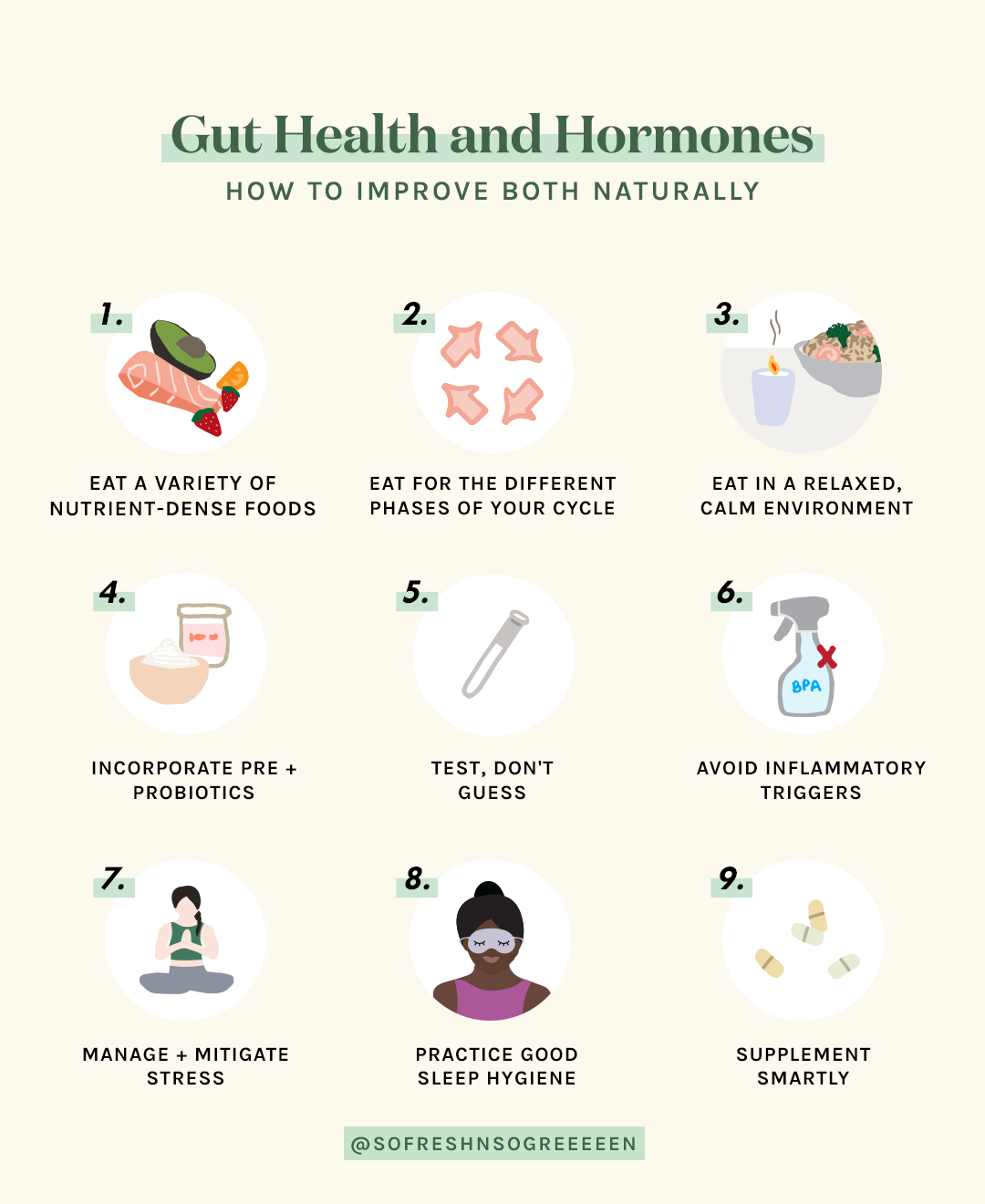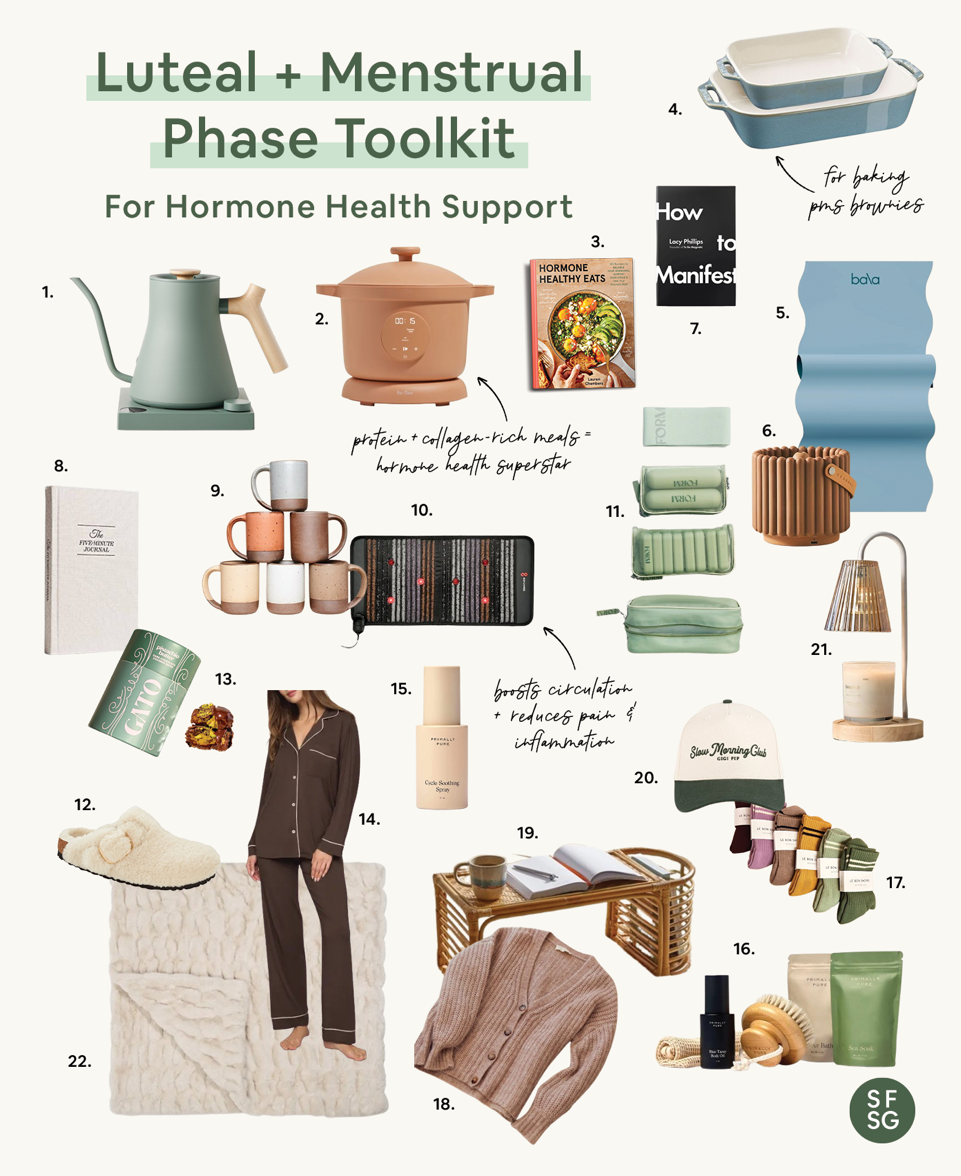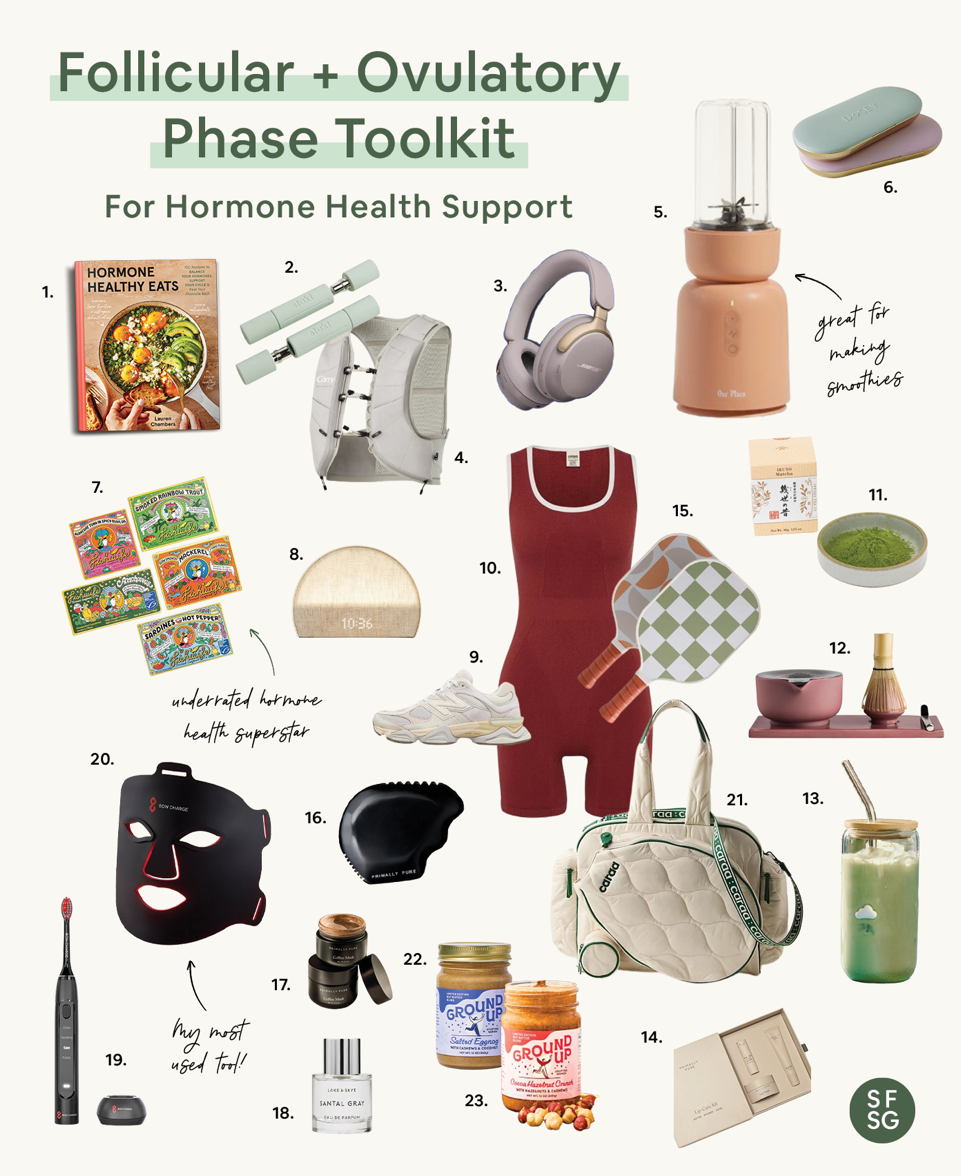recipes
lifestyle
wellness
motherhood
mindset
About
E-Books
Blog
Freebies
partnerships
hi, i'm lauren!
hey there!
I’m on a hot mission to help you balance your hormones & live your best life.
categories
Home
Quiz
Get In Touch
The Course
search:
Cookbook
Recipe key
GF
VG
P
Vegan
Gluten Free
Paleo
DF
Dairy-Free
download now
Join Hormone Healthy Eats!
Become a SFNSG insider to get my monthly Substack, Hormone Healthy Eats! Packed with the latest hormone-healthy recipes
+ tips.
jump to recipe >
GUT HEALTH AND HORMONES — THE CONNECTION
By now, you’ve probably heard that both gut health and hormone health are important, but the two are also inextricably linked (i.e. the state of one’s health depends on the other, and vice versa).
In fact, many hormone imbalances begin in the gut, and the gut has a powerful impact on our hormones. This is because our gut microbiome:
-
+ Houses 70-80% of our immune system, which if disrupted or inflamed can lead to autoimmune conditions and hormone imbalances
-
+ Contains a group of bacteria known as the estrobolome, which is responsible for metabolizing and eliminating estrogen from the body
-
+ Absorbs nutrients from our food/supplements in order to synthesize hormones
-
+ Supports the elimination of toxins and chemicals that can otherwise lead to hormone imbalances
-
+ Works to keep blood sugar in check, critical for hormone balance
PRO-TIP: A quick, easy + efficient way to jump-start your gut health is with a quality probiotic. This is the brand I use and you can use code SOFRESH15 to save.
HOW AN UNHEALTHY GUT AFFECTS HORMONES
When our gut microbiome contains a healthy balance of bacteria, our gut can do some pretty amazing things (i.e. see above). But in today’s world, we’re exposed to a variety of toxins, chemicals, pollutants, processed foods, prescriptions, alcohol, drugs and stress that wreak havoc on our gut microbiome, causing what’s known as dysbiosis, or an imbalance of the gut bacteria. When this happens it can lead to:
+ Leaky Gut
When gut bacteria becomes unbalanced, food and nutrients aren’t absorbed well, and larger molecules are able to cross the gut wall, causing food sensitivities and increasing inflammation in the body. This can provoke an immune response and trigger an autoimmune condition if left untreated, leading to hormone disruption, such as impaired ovulation or progesterone production (infertility), overstimulated estrogen or testosterone (painful periods, PCOS, endometriosis and breakouts) and blocked thyroid hormone (metabolism, temperature, mood, etc.).
+ Impaired Nutrient Absorption
When gut bacteria becomes imbalanced, our microbiome is unable to extract nutrients from our food/supplements effectively (which is then used to produce hormones). Over time this can lead to nutrient deficiencies, which is a root cause of many hormone imbalances.
+ Impaired Thyroid Conversion
Healthy gut flora is required for thyroid hormone conversion (approximately 20% of it takes place in your gut), enabling you to get enough T3, the active form of thyroid hormone you need to keep your energy, metabolism, weight, body heat and reproductive system stable (among many other roles). If your gut is not functioning optimally you can experience symptoms of hypothyroidism, even if your thyroid is healthy.
+ Constipation and Excess Estrogen
When your estrobolome, a collection of bugs in the gut devoted to processing and eliminating estrogen from the body, is balanced, it keeps your estrogen levels balanced too. But when these bugs become imbalanced, so does your ability to eliminate estrogen, often leading to estrogen dominance, a hormone imbalance associated with painful, heavy periods and PMS.
Not only that, but impaired thyroid conversion (see above) can lead to constipation, which can also impair estrogen elimination and lead to estrogen dominance.
POTENTIAL CAUSES OF AN UNHEALTHY GUT
So, what causes an unhealthy gut, or gut bacteria imbalance to begin with? Common culprits include:
-
+ Chronic Stress
-
+ Diets High In Sugar/Processed Foods
-
+ Diets Lacking Fiber/A Variety of Plants
-
+ Hormonal Birth Control Use
-
+ Antibiotic/NSAID Use
-
+ Toxin Exposure (via personal care + home products, processed foods/pesticides, etc.)
-
+ Lack of Sleep
-
+ Sedentary Lifestyle (lack of exercise/regular movement)
SIGNS + SYMPTOMS OF AN UNHEALTHY GUT
Wondering if you have an unhealthy gut that could in turn be affecting your hormone health? Common symptoms and signs include:
-
+ Bloating and Gas
-
+ Diarrhea/Constipation or A Combination of Both
-
+ Acne or Other Skin Issues (Rosacea, Eczema)
-
+ Heartburn
-
+ Headaches
-
+ Brain Fog/Inability to Concentrate
-
+ Anxiety/Depression
-
+ Chronic Fatigue
-
+ Frequent Illnesses (Colds, Yeast Infections, etc.)
-
+ Bad Breath/Halitosis
-
+ Difficulty Losing Weight
-
+ Hormone Imbalance Symptoms Such As PMS, Heavy or Painful Periods, Irregular or Missing Periods, Fertility Challenges, PCOS, Endometriosis, etc.)
HOW TO IMPROVE GUT HEALTH NATURALLY FOR BALANCED HORMONES
In order to optimize your gut health, which will in turn work to balance hormones and sustain a healthy menstrual cycle, these are some of the most easy and effective natural steps you can take:
1. Eat a Diverse Variety of Nutrient-Dense Foods
Eating a diverse variety of nutrient-dense foods rich in quality protein, fiber and fat ensures you’re providing your body with the raw materials it needs to produce healthy hormones, as well as optimize digestion, regulate blood sugar, boost good gut bacteria and effectively eliminate toxins. Try focusing on adding in a new/different fruit or veggie and protein every week (or see #2 for more tips).
2. Eat For The Different Phases Of Your Cycle
Consuming a variety of foods based on where you’re at in your cycle not only supports different hormone fluctuations by meeting different nutrient needs but by rotating different foods and cooking methods your gut doesn’t get too overexposed to any particular food that may be causing an inflammatory response. See this post on how to eat for each phase of your cycle or check out my Hormone Balance Reset Plan for phase-specific recipes, grocery shopping lists, recommended foods, etc.
3. Eat In A Calm, Relaxed Environment
Eating in a calm, relaxed state allows your body to tap into its parasympathetic nervous system (aka rest and digest mode) and properly absorb the nutrients you’re consuming (vs. eating on the go or in a stressed out state, when your body has to divert energy away from digestion in response to a “threat”). Try eating at least one meal per day without distractions (i.e. no phone, tv, etc.) while sitting down at a table. Allow yourself to relax and fully enjoy. Bonus points if you can do it with a friend, family member or loved one!
4. Incorporate Prebiotics + Probiotics
Probiotics work to implant the gut with a plethora of healthy bacteria and can be incredibly beneficial, but there’s a lot of snake oil out there, so it’s important to do your research before purchasing just any probiotic supplement (FYI this is the brand I personally use and recommend to clients, you can use my code SOFRESH15 to save 15%).
Lesser known, but still equally important is the incorporation of prebiotics into your diet, which is food that those healthy bacteria feed off of in order to proliferate and thrive. Good sources of prebiotic rich foods include cooked onion and asparagus, green bananas, chicory root, artichokes, dandelion greens and oats (hello baked oatmeal), while fermented coconut/greek yogurt, kimchi, sauerkraut, kombucha and kefir contain probiotics.
5. Test, Don’t Guess
Sometimes the only way to assess the real state of your gut health is with functional lab testing. I typically encourage clients to meet with a functional medicine practitioner or naturopathic doctor who can administer testing for conditions such as SIBO, bacterial dysbiosis, and pathogens/parasites. Narrowing in on your condition will only help you take a more targeted, tailored and effective approach to getting your gut health and hormones back on track.
6. Avoid Inflammatory Triggers When Possible
Inflammatory triggers can vary based on your unique gut microbiome and hormone balance, but for most people these triggers include refined sugar, alcohol, gluten, corn, dairy and processed foods in general. If you suspect you have a food intolerance or sensitivity, I encourage looking into a food sensitivity panel combined with a stool sample that takes a comprehensive look at the health of your gut microbiome.
If possible, I also encourage you to buy organic produce and wild-caught, grass-fed, and pasture-raised seafood and animal products to avoid toxins that wreak havoc on your gut, decimating the good bacteria, eventually leading to dysbiosis or leaky gut.
Lastly, discontinuing use of hormonal birth control, antibiotics and NSAID’s (OTC meds like ibuprofen, etc.) will go a long way in eliminating inflammation and protecting your gut health, as all contribute to damage of the intestinal lining (aka leaky gut) and disrupt your bacteria balance.
7. Manage + Mitigate Stress
By this point I’m pretty sure we all know chronic stress isn’t good for us, but did you know it’s a huge trigger for gut and hormone imbalances? This is because it can actually alter the natural balance of healthy bacteria in your gut, leading to dysbiosis, disrupted nutrient absorption, leaky gut and impaired thyroid conversion.
While life will always throw us curveballs, I encourage clients to stay ahead of the game by incorporating routines and having tools on hand to better manage and cope with stress. This could be different for every person, but a few tools and techniques I love include exercise/movement, getting outside/in nature, dancing or listening to music, connecting with friends/loved ones, meditation or deep breathing practices, therapy, EFT, cooking or baking, and setting firm boundaries around work, social media use, etc.
8. Practice Good Sleep Hygiene
Research shows optimal sleep levels are directly linked to a healthy gut flora balance, with a lack of correlated to an unbalanced microbiome, and by now I’m pretty sure you know what that means.
Getting optimal sleep, however, is easier said than done, and I find it’s easiest to obtain when clients (and myself) practice good sleep hygiene practices throughout the day and the 1-2 hours leading up to bed. Day time practices that promote quality sleep include sunlight exposure first thing in the am, exercise, eating regular and balanced meals, getting out in nature, and taking breaks from screens, while bedtime routine practices span from staying off screens/phones at least 1-2 hours before bed (or wearing blue light blocking glasses) to anything calming like an epsom salt bath, drinking tea, reading a good book or a breathing exercise/meditation.
9. Supplement Smartly
A targeted supplement approach alongside the practices listed above can be extremely effective, but it won’t work nearly as well (or much at all) on it’s own. I also encourage you to check in with your medical practitioner before taking additional supplements, especially if currently on medications or have preexisting medical conditions. That being said, some supplements I recommend looking into to repair your gut health include probiotics (this one is my fave and you can use my code SOFRESH15 to save 15%) as well as L-glutamine, curcumin extract, ginger root, marshmallow root and zinc.
BOTTOMLINE
The healthier your gut is, the healthier your hormones are, empowering you to have a healthy menstrual cycle, alleviate uncomfortable symptoms and look and feel your very best.
The steps above are simple, natural and effective ways to boost both gut and hormone health, but if you’re experiencing signs and symptoms of an unhealthy gut I also encourage you to seek out support from a functional medicine practitioner or ND who can administer root cause testing and help you take a targeted approach.
OTHER GUT HEALTHY RECIPES + RESOURCES
+ Gut-Friendly Paleo Butter Chicken
+ Gut-Friendly Sweet Potato Pesto Quinoa Bowl Recipe
+ Foods To Eat For Each Phase of Your Menstrual Cycle
This post contains affiliate links. We may receive a small commission for purchases made through these links. Thank you for your support!

If you loved that...

01.

02.

03.

04.

05.
hey!
Keep Browsing
Site
Keep Browsing
Site
the
about
e-books
blog
downloads
quiz
Welcome friend, I'm lauren.
I’m honored to support you on your journey to optimal hormone health + happiness. Thanks for being here babe.


